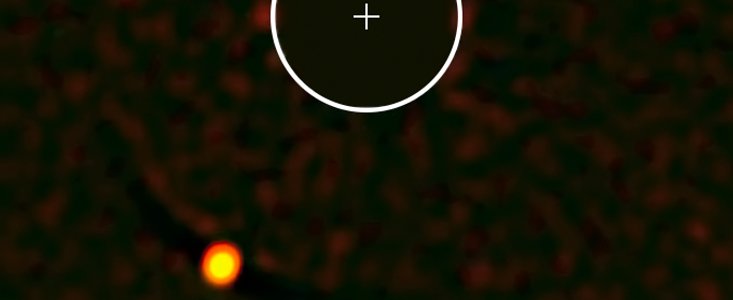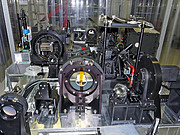Tiedote
ESO:n SPHERE löysi ensimmäisen eksoplaneettansa
6. heinäkuuta 2017
Yksi nykypäivän tähtitieteen haastavimmista ja mielenkiintoisimmista osa-alueista on eksoplaneettojen ja muita tähtiä kiertävien maailmojen etsiminen. ESO:n VLT-teleskoopin SPHERE (Spectro-Polarimetric High-contrast Exoplanet REsearch instrument) -intrumentti on hiljattain löytänyt eksoplaneetta HIP 65426b:n. Noin 385 valovuoden päässä oleva HIP 65426b on ensimmäinen SPHERE:n löytämä eksoplaneetta [1] ja se sattuu olemaan erittäin kiinnostava.
Planeetta on lämmin (1000-1400 °C) ja massaltaan kuudesta kahteentoista Jupiterin massaa. Sillä näyttää olevan todella pölyinen ja runsaspilvinen ilmakehä ja se kiertää nuorta ja kuumaa yllättävän nopeasti pyörivää tähteä. Tähdellä ei ole pölyrengasta ympärillään, mikä on epätavallista näin nuorelle tähdelle. Kiekon puute herättää mielenkiintoisia kysymyksiä siitä, miten planeetta edes syntyi. Planeetta on saattanut muodostua kaasu- ja pölykiekosta ja kiekon äkillisesti kadotessa planeetta siirtyi nykyiselle kaukaisemmalle kiertoradalleen muiden planeettojen vuorovaikuttaessa siihen. Tähti ja planeetta ovat myös saattaneet muodostua yhdessä kaksoisjärjestelmänä, jossa massiivisempi osapuoli esti toista tähden aihiota keräämästä riittävästi materiaa, jotta siitä olisi voinut muodostua tähti. Planeetan löytäminen antaa tähtitieteilijöille mahdollisuuden tutkia pilvien rakennetta ja sijaintia sen ilmakehässä ja kokeilla teoriaa eksoplaneettojen muodostumisesta, evoluutiosta ja fysiikasta.
SPHERE on tehokas planeettojen etsijä, joka on asennettu VLT:n UT3:een. Sen tieteellinen tavoite on havaita ja tutkia uusia, valtavia, läheisiä tähtiä kiertäviä eksoplaneettoja ottamalla niistä suoraan kuvia [2]. Tässä metodissa pyritään ottamaan suoraan kuvia eksoplaneetoista ja tähtiä ympäröivistä pölypilvistä. Metodi muistuttaa tavallisen valokuvan ottamista. Suora kuvantaminen on hankalaa, sillä tähden valo on niin voimakas, että se peittää alleen sitä kiertävistä planeetoista heijastuvan heikon valon. SPHERE on kuitenkin älykkäästi suunniteltu voittamaan tämän haasteen etsimällä planeettojen pinnasta heijastunutta polarisoitunutta valoa.
Tämä valokuva otettiin osana SHINE-nimistä tutkimus ohjelmaa (SpHere Infrared survey for Exoplanets). SHINE:n tavoitteena on kuvata 600 läheistä tähteä lähi-infrapunan alueella käyttäen SPHERE:n suurta kontrastia ja erotuskykyä löytääkseen ja luokitellakseen uusia planeettajärjestelmiä ja tutkiakseen miten ne ovat syntyneet.
Lisähuomioita
[1] ESO: aikaisempi lehdistötiedoite, mikä julkistettiin aikaisemmin SPHERE:n havainnosta koski myös planeettaa. Tämä tulkinta on kuitenkin kyseenalaistettu ja siten HIP 65426b on tällä hetkellä ensimmäinen luotettava SPHERE:n tekemä eksoplaneettahavainto.
[2] Exoplaneettojen tutkimisessa tähtitieteilijät käyttävät useita eri menetelmiä. Monet planeettahavainnot ovat epäsuoria. Tähtitieteilijät voivat havaita tähden pienen kirkkaudenmuutoksen, kun planeetta kulkee sen editse, tai he voivat mitata tähden liikkeen pieniä muutoksia, mitkä aiheutuvat sitä kiertävän planeetan aiheuttamista gravitaation vaikutuksista. On kuitenkin olemassa myös suoraviivainen menetelmä, eli suora kuvantaminen.
Linkit
Yhteystiedot
Gaël Chauvin
Institut de Planetologie et d'Astrophysique de Grenoble (IPAG)
BP 53, 38041 Grenoble Cedex 9, France
Puh.: +33 6 4551 8209
S-posti: gael.chauvin@univ-grenoble-alpes.fr
Jean-Luc Beuzit
Institut de Planetologie et d'Astrophysique de Grenoble (IPAG)
BP 53, 38041 Grenoble Cedex 9, France
Puh.: +33 6 8739 6285
S-posti: jean-luc.beuzit@univ-grenoble-alpes.fr
Richard Hook
ESO Public Information Officer
Garching bei München, Germany
Puh.: +49 89 3200 6655
Matkapuhelin: +49 151 1537 3591
S-posti: rhook@eso.org
Tiedotteesta
| Tunnistus: | ann17041 |
Our use of Cookies
We use cookies that are essential for accessing our websites and using our services. We also use cookies to analyse, measure and improve our websites’ performance, to enable content sharing via social media and to display media content hosted on third-party platforms.
ESO Cookies Policy
The European Organisation for Astronomical Research in the Southern Hemisphere (ESO) is the pre-eminent intergovernmental science and technology organisation in astronomy. It carries out an ambitious programme focused on the design, construction and operation of powerful ground-based observing facilities for astronomy.
This Cookies Policy is intended to provide clarity by outlining the cookies used on the ESO public websites, their functions, the options you have for controlling them, and the ways you can contact us for additional details.
What are cookies?
Cookies are small pieces of data stored on your device by websites you visit. They serve various purposes, such as remembering login credentials and preferences and enhance your browsing experience.
Categories of cookies we use
Essential cookies (always active): These cookies are strictly necessary for the proper functioning of our website. Without these cookies, the website cannot operate correctly, and certain services, such as logging in or accessing secure areas, may not be available; because they are essential for the website’s operation, they cannot be disabled.
Functional Cookies: These cookies enhance your browsing experience by enabling additional features and personalization, such as remembering your preferences and settings. While not strictly necessary for the website to function, they improve usability and convenience; these cookies are only placed if you provide your consent.
Analytics cookies: These cookies collect information about how visitors interact with our website, such as which pages are visited most often and how users navigate the site. This data helps us improve website performance, optimize content, and enhance the user experience; these cookies are only placed if you provide your consent. We use the following analytics cookies.
Matomo Cookies:
This website uses Matomo (formerly Piwik), an open source software which enables the statistical analysis of website visits. Matomo uses cookies (text files) which are saved on your computer and which allow us to analyze how you use our website. The website user information generated by the cookies will only be saved on the servers of our IT Department. We use this information to analyze www.eso.org visits and to prepare reports on website activities. These data will not be disclosed to third parties.
On behalf of ESO, Matomo will use this information for the purpose of evaluating your use of the website, compiling reports on website activity and providing other services relating to website activity and internet usage.
Matomo cookies settings:
Additional Third-party cookies on ESO websites: some of our pages display content from external providers, e.g. YouTube.
Such third-party services are outside of ESO control and may, at any time, change their terms of service, use of cookies, etc.
YouTube: Some videos on the ESO website are embedded from ESO’s official YouTube channel. We have enabled YouTube’s privacy-enhanced mode, meaning that no cookies are set unless the user actively clicks on the video to play it. Additionally, in this mode, YouTube does not store any personally identifiable cookie data for embedded video playbacks. For more details, please refer to YouTube’s embedding videos information page.
Cookies can also be classified based on the following elements.
Regarding the domain, there are:
- First-party cookies, set by the website you are currently visiting. They are stored by the same domain that you are browsing and are used to enhance your experience on that site;
- Third-party cookies, set by a domain other than the one you are currently visiting.
As for their duration, cookies can be:
- Browser-session cookies, which are deleted when the user closes the browser;
- Stored cookies, which stay on the user's device for a predetermined period of time.
How to manage cookies
Cookie settings: You can modify your cookie choices for the ESO webpages at any time by clicking on the link Cookie settings at the bottom of any page.
In your browser: If you wish to delete cookies or instruct your browser to delete or block cookies by default, please visit the help pages of your browser:
Please be aware that if you delete or decline cookies, certain functionalities of our website may be not be available and your browsing experience may be affected.
You can set most browsers to prevent any cookies being placed on your device, but you may then have to manually adjust some preferences every time you visit a site/page. And some services and functionalities may not work properly at all (e.g. profile logging-in, shop check out).
Updates to the ESO Cookies Policy
The ESO Cookies Policy may be subject to future updates, which will be made available on this page.
Additional information
For any queries related to cookies, please contact: pdprATesoDOTorg.
As ESO public webpages are managed by our Department of Communication, your questions will be dealt with the support of the said Department.


